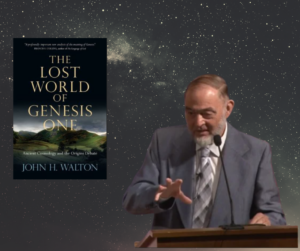I recently watched a debate between my friend Zachary Lawson and Kent Hovind. The topic was on “Is Evolution Compatible With The Bible?” I was excited for this debate as creation and evolution is one of the theological subjects I’m heavily interested in. I was on Zach’s side, as anyone who’s been following this blog will know. They talked about (1) The Genealogies, (2) Jesus’ view on creation (focusing on Mark 10:6), (3) Exegesis of Exodus 20:11, and (4) Animal Death before the fall.
One of the points that Hovind brought up, and one that he brings up in all of his debates, is that anything other than The Calender Day View (or the Neo-Ussherian view as Zach called it, named after bishop James Ussher) is too complicated, and the average person would never come to an OEC (Old Earth Creationist) or EC (Evolutionary Creationist) understanding of the text apart from having some scholar telling him that that’s what the text means. He’ll say something like “I don’t believe you need a guru to tell you what The Bible said. I think God made Himself plain and clear. God created everything in 6 days”. In his debate with Hugh Ross which took place 17 years ago, he said that “If you need some guru to tell you what The Bible says, then you’ve got a cult” (paraphrase).
For some reason, Hovind thinks that The Bible has to be easy to read, and if your interpretation isn’t a prima facie (face value) interpretation, or if your interpretation is even the least bit complex, then it must be wrong. We don’t need gurus to tell us what The Bible says. God’s Word is intended for all people. You don’t need a Ph.D to understand what He says. God’s Word is intended for all people, and therefore all people can understand it.
I think Lawson gave a brilliant response to this argument of Hovind’s (which he ran into the ground in his debate with Ross). However, I’d like to offer my own thoughts on this matter, as I think Hovind is preaching a half-truth.
All Of The Essential Truths Of Salvation Can Be Easily Understood By All
If you want to understand the gospel, you need no degree. Even a person who never made it passed the third grade can open his Bible, read through it and understand that The Bible is saying the following things: (1) All human beings are sinful, (2) God is righteous and must punish people who sin, (3) God loves the human race and sent His son to take the punishment on our behalf, (4), Jesus rose from the dead, conquring death not only for Himself, but for us as well, (5) Because of Jesus’ shed blood, we can receive forgiveness for the transgressions we’ve committed against God. All we need to do is repent and ask Christ to be our personal Lord and Savior.
This is the gospel in a nutshell. And this is something that anyone, anywhere, even a 1st grader can get from the text if he picks up a Bible and read it. Yes, God did intend His Word for all people because in it, we find the information needed to come into a saving relationship with Him.
The Central Message Of Genesis One Can Be Understood At All
Genesis 1 has a major, overarching, and overwhelmingly obvious theme and message. What is that? It’s that God is the Creator of everything that exists. There is nothing that exists or came into existence that did not come into existence by God’s creative decree (cf. John 1:3). If you can read, you can get this message. Genesis 1 says that God created the entire universe! He created the sun, moon, and stars. He created the birds. He created the fish. He created all land animals such as cattle, “beasts of the field” and bugs (i.e things that creepeth along the ground). He created human beings, and moreover, He created human beings in His image.
Anyone, anywhere, with any level of education can understand that this is what Genesis 1 is telling us.
While The Central Message Is Clear To All, The Peripherals May Not Be
While the central message of Genesis 1 (i.e that anything that exists, it exists because God created it) can be grasped by all, the peripheral details may not be. It may be that the details of the passage can only be understood by (in Lawson’s words) “doing the leg work”. For example, how long are the days? Are these 24 hour periods or long time periods? Are the days even meant to be an account of natural history, and if they are, are they intended to be telling natural history in chronological order? Maybe some kind of Framework Hypothesis is correct. Is God talking about material creation or functional creation? Is He talking about both? These are the questions that may need some heavy thinking to come to firm conclusions on.
The Calendar Day view may be the simplest, but that doesn’t mean it’s correct. I myself find the Day-Age view and Framework Hypothesis to be the most probably true readings of the text. I’m on the fence between them. I think both views have a lot of merit. I am open to John Walton’s view, but I’m slightly skeptical of it. However, I’m not skeptical of it because “it requires a guru to tell you”, but because I do think material origins are in view in the text.
But I won’t get into the reasons why The Day-Age and Framework views have more merit than Hovind’s interpretation. That is not the point of this blog post. The point of this blog post is that you can’t reject an interpretation just because it’s not obvious. You need to weigh the arguments for and against a certain interpretation, and base your acceptance or rejection of an interpretation on that basis.
The Bible is simple enough for a child, but profound enough for the scholar. As Charles Spurgeon said “No one outgrows scripture. It widens and deepens with our years.” Every time I go through The Bible, I pick up on things I missed before. Sometimes I see the text in a whole new light that I didn’t see it in on the first go round, or the second go round, or even the third go round.
Does The Bible Support What I’m Saying?
Absolutely! On the one hand, Paul says “But continue thou in the things which thou hast learned and hast been assured of, knowing of whom thou hast learned them; And that from a child thou hast known the holy scriptures, which are able to make thee wise unto salvation through faith which is in Christ Jesus.” (2 Timothy 3:14-15, KJV, emphasis mine). On the other hand, the apostle Peter says “As also in all his epistles, speaking in them of these things; in which are some things hard to be understood, which they that are unlearned and unstable wrest, as they do also the other scriptures, unto their own destruction.” (2 Peter 3:16, KJV, emphasis mine). I quoted from the KJV because that’s the only translation Hovind accepts, and in case he stumbles upon this article.
According to Paul, a child can understand the scriptures. According to Peter, some things in scripture (he considered Paul’s letters inspired) are hard to understand. We can get the central message of scripture, but some of the details are hard to work out.
Conclusion
Kent Hovind should probably stop making the argument that if the interpretation requires some heavy thinking, that it must therefore be wrong. As Zachary Lawson said in the debate, that kind of argumentation is extremely anti-intellectual. His reasoning would logically entail that taking hermenuetics classes is a waste of time. His reasoning would logically entail that commentaries are a waste of time. Just take those commentaries and throw them away. You just need to read your Bible, yo. Your first reading of the text is going to be correct, because God’s Word is easy to read. The Apostle Peter didn’t think so (2 Peter 3:16), but apparently, Hovind does.
Hovind’s argument against OEC and EC views on Genesis 1 is just….bad.






I think we believe there needs to be more to creation because we think we know what happened. God is the creator, do we give him that title but take away some of it’s attributes. He created all that we know, including time and the perception of it. He knows what’s involved in the creation of all that we know. He is the master of time and space. It is within his ability to speed that up or slow it down as he sees fit, or do neither and just make it appear. We may make an observation that this or that takes time to “evolve”, but I think God might laugh a bit and say “sure it does”. We should marvel that he did it in the time frame as stated because he is God. He did mean his word to be understood and clear and he did know this would be a sticking point because we often think too much of ourselves. Being humble as a child to be saved, do we believe him, I do because he is the creator.
Are you postulating some kind of appearance of age thesis? Are you saying evolution happened, but that it happened in an extremely quick way? That’s what I took from “It is within his ability to speed that up or slow it down as he sees fit, or do neither and just make it appear. We may make an observation that this or that takes time to ‘evolve’, but I think God might laugh a bit and say ‘sure it does’.”
.
If I’m interpreting you correctly, I think you should reject this idea. If God created the universe to look like it had undergone billions of years of history when it really hadn’t and if he created life in such a way as that it looks like all life shares a universal common ancestry, then God would be a deceiver. The Bible says God cannot lie (Numbers 23:19, Titus 1:2, Hebrews 6:18). I do think God has the ability to create all things in a single week or even an instant if he wanted to. However, if he had, things would have been different. We would not see the light from stars millions of light years away, but only the light from the stars close enough for their light to reach us in thousands of years. Humanity would not share ERVs, atavisms, and psuedogenes with the great apes if God had created us and the great apes seperately from one another de novo. “But Adam was created with an appearance of age!” Assuming the literal de novo interpretation of Adam is correct, Adam was created as a fully grown adult, sure. But was Adam created with acne scars from teenage years he never experienced? Did he have a bag of photos from a childhood vacation he never took? Did he have age spots? These are more akin to the signs of age scientists find in nature. So did God create canyons with the appearance of millions of years of erosion? Did God create stars with light that looks like they’ve been traveling for millions of years? Not the God of truth that I serve! Aaron Yilmaz has a great chapter on this in his book “Deliver Us From Evolution?: A Christian Biologist’s In-Depth Look At The Evidence Reveals A Surprising Harmony Between Science and God”. He lists a bunch of examples.
.
I also believe what Genesis 1 says about God’s creation. You YECs never seem to understand that it is not the case that you believe The Bible and we non-YECs don’t. The issue is we have come to different interpretive conclusions. I recommend my essay “Genesis 1: Functional Creation, Temple Inauguration, and Anti-Pagan Polemics” –> https://cerebralfaith.net/genesis-1-functional-creation-temple-inauguration-and-anti-pagan-polemics/